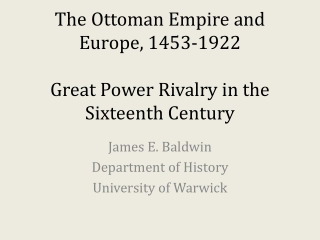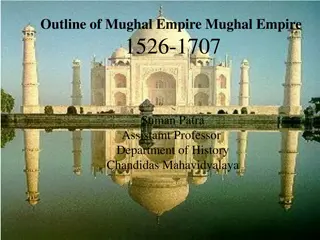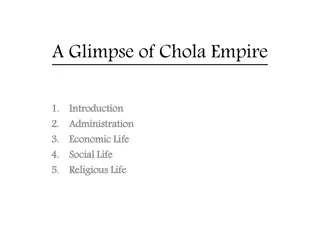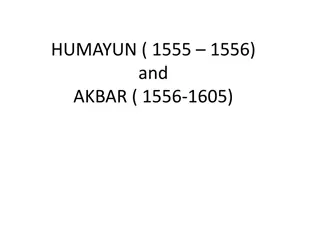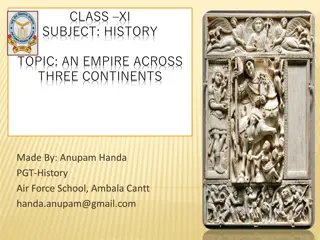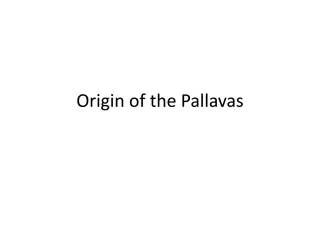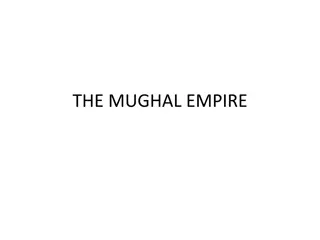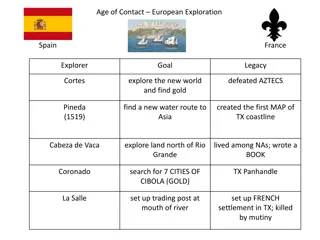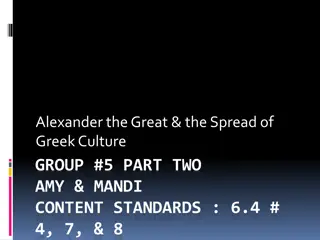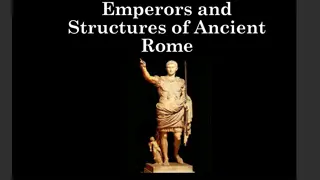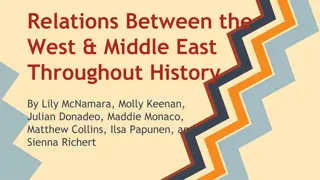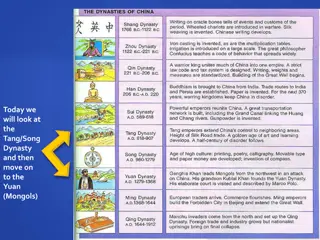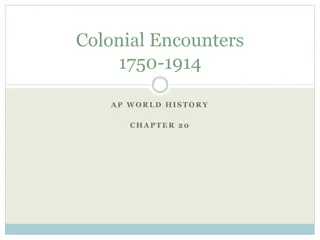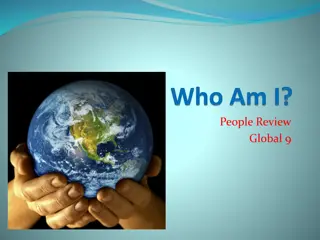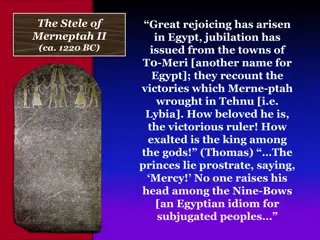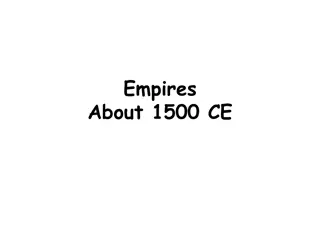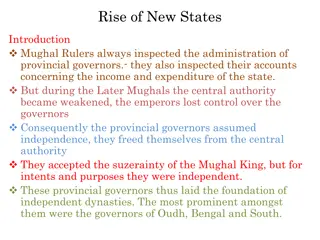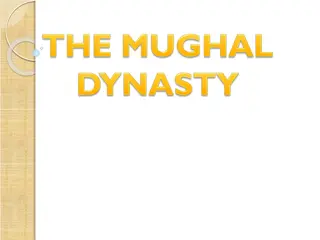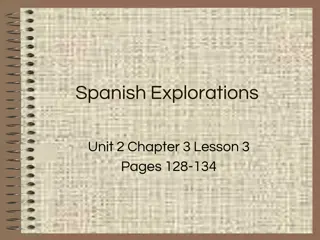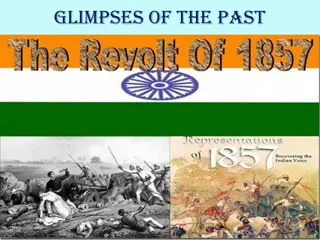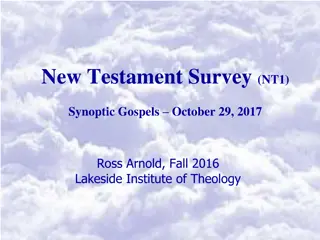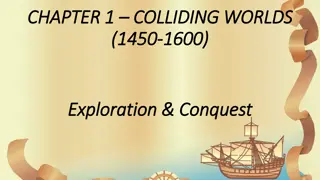The Ottoman Empire and Europe, 1453-1922
The interaction between the Ottoman Empire and European powers, including the Habsburgs, Safavids, Mamluks, and Russia, shaped the geopolitical landscape of the 16th century. This period saw Ottoman expansion, clashes between different empires, and complex motivations behind territorial conquests, i
0 views • 16 slides
Outline of Mughal Empire Mughal Empire 1526-1707.
The Mughal Empire in India from 1526 to 1707 was a significant period marked by notable rulers such as Babur, Humayun, Akbar, Jehangir, Shah Jehan, and Aurangzeb. These emperors each contributed differently to the empire's development, with highlights including military conquests, administrative ref
7 views • 14 slides
A Glimpse of Chola Empire: Rise and Fall of an Ancient Dynasty
The Chola Empire, under rulers like Vijayalaya, Aditya I, and Rajaraja I, witnessed periods of expansion, conquests, and cultural advancements. Their efficient administration, economic prosperity, social structure, and religious practices are discussed, highlighting the empire's zenith under Arumoli
0 views • 11 slides
The Mughal Emperors Humayun and Akbar: A Legacy of Conquest and Diplomacy
Humayun, though not a skilled general, was kind and learned, while Akbar, one of the greatest monarchs of India, expanded the Mughal Empire through military conquests and strategic alliances with the Rajputs. Akbar's policy of religious tolerance and Rajput integration left a lasting impact on the M
0 views • 21 slides
An Empire Across Three Continents - A Historical Journey
Explore the fascinating history of an empire spanning three continents, from the rise of trade networks in the Assyrian empire to Alexander the Great's conquests and the evolution of Rome into a dominant power. Discover the shared cultures, languages, and sources that illuminate the rich past of the
1 views • 34 slides
The Pallavas: Origins, Politics, and Achievements
The Pallavas, an ancient dynasty in South India, had multiple theories surrounding their origin, with some suggesting Persian descent. Their political history saw conflicts with the Chalukyas and a focus on military conquests. Notable rulers like Mahendravarman I and Narasimhavarman I expanded the P
0 views • 7 slides
Rise and Legacy of the Later Cholas in South India
The Later Cholas, starting in the 9th Century, established a powerful empire in South India known as the Imperial Cholas. Sources such as inscriptions, monuments, numismatic sources, and literary works provide valuable insights into their history and rule. Monuments like the Brahadeewarar Temple and
0 views • 10 slides
The Mughal Empire: History and Legacy
The Mughal Empire was founded by Babur, a skilled statesman and conqueror. His military conquests paved the way for the empire's expansion in India. Babur's son Humayun faced challenges during his reign, leading to a period of instability. Despite difficulties, the Mughal Empire left a lasting impac
0 views • 13 slides
European Exploration and Missions in Texas: Legacy and Impact
Spain and France's explorers like Cortes, Pineda, Cabeza de Vaca, and others ventured into the New World, shaping Texas history with discoveries, conquests, and missions to convert natives. The journey includes expeditions, conflicts, and the establishment of missions that secured Texas for Spain bu
3 views • 3 slides
Reflections on Aristotelian Philosophy and the Divine Cosmos
Explore the depth of Aristotelian philosophy, from the distinction between terrestrial and celestial motion to the concept of the Unmoved Mover as the source of all movement. Delve into the intricacies of the Tripartite Cosmos, comprising the Empyreum, Sublunary World, Earth, and Underworld, and dis
0 views • 18 slides
Alexander the Great: Conquests and Legacy
Macedonia, under King Philip II and his son Alexander the Great, rose to power and spread Greek culture through conquests in Asia, Egypt, and beyond. After Alexander's death, his empire fragmented into four regions, leaving behind a lasting impact on history.
0 views • 41 slides
Overview of Joshua's Conquests and Division of Land in Canaan
This content provides an outline of the Book of Joshua, detailing the various chapters such as the charge to Joshua, the spies in Jericho, the crossing of the Jordan River, the conquest of Jericho, the defeat at Ai, and the division of the conquered land among the tribes of Israel. It also highlight
0 views • 18 slides
Emperors and Structures of Ancient Rome
Julius Caesar expanded the Roman Republic through conquests, Augustus Caesar transformed Rome into an empire, Hadrian was known for good governance and building, Diocletian split the empire, Caligula's reign turned cruel, and Nero's rule was marked by cruelty and the infamous burning of Rome.
0 views • 10 slides
Historical Relations Between the West and Middle East
This detailed historical overview explores the complex interactions between the Western and Middle Eastern regions, including topics such as Western imperialism, the rise of Islam, conflicts due to religion, invasion of the Iberian Peninsula, and the impact of the Crusades. It sheds light on the cul
0 views • 17 slides
Rise and Legacy of the Mongol Empire
The rise of the Mongol Empire under Genghis Khan, the unification of Mongols, conquests, and the establishment of the Yuan Dynasty by Kublai Khan are highlighted. The Mongols' military prowess, organizational skills, and cultural adaptability led to the largest land empire in history. The Pax Mongol
0 views • 11 slides
European Colonial Encounters 1750-1914: Paths to Imperialism
Second wave European conquests in the 18th and 19th centuries saw a shift towards informal control and military force in establishing empires in Africa and Asia. Various paths to colonial status emerged in India, Indonesia, Australia, and New Zealand, reflecting different colonization methods and ou
0 views • 21 slides
Influential Figures in Global History
Explore the lives of historical figures such as Alexander the Great, Montesquieu, Julius Caesar, John Calvin, Catherine the Great, Napoleon Bonaparte, Confucius, and Constantine. These individuals left a mark on different eras through their conquests, philosophies, reforms, and governance, shaping t
0 views • 27 slides
Ancient Egyptian Stele of Merneptah II and Israel: Historical Inscriptions
The Stele of Merneptah II, dating back to around 1220 BC, provides insights into ancient Egyptian victories in Libya, pacification of the Hittite Empire, and the desolation of Israel. It is one of the oldest references to Israel outside the Bible, shedding light on historical events and the status o
0 views • 6 slides
The Mongols: Assessing Their Impact on Asia
Exploring the complex legacy of the Mongols in Asia, examining both their destructive conquests and their positive contributions to political, economic, and cultural realms. Various sources are analyzed to understand the dual nature of the Mongol Empire, prompting a consideration of how history shou
0 views • 13 slides
The Empires and Explorations of 1500 CE
Explore the empires and events of 1500 CE, from the Ottoman Empire to the Mughal Empire, and the reasons behind European exploration. Immerse yourself in the history of trade, culture, and conquests that shaped this era.
0 views • 26 slides
The Rise of New States and Hindu Principalities in Decline of the Mughal Empire
During the later Mughal period, provincial governors gained independence, laying the foundation for new dynasties in regions like Oudh, Bengal, and South. The rise of Hindu states, including Rajputs and Sikhs, contributed to the disintegration of the Mughal Empire. Governors like Saadat Khan Burhan-
0 views • 8 slides
Overview of the Mughal Empire and Its Great Mughals
The Mughal Empire was a significant imperial power in the Indian subcontinent from 1526 to 1757, ruled by Muslim descendants of Genghis Khan. The empire extended over a vast region and produced six great Mughal rulers: Babur, Humayun, Akbar, Jahangir, Shah Jahan, and Aurangzeb. Babur was the founder
0 views • 14 slides
Spanish Explorations: Conquest and Legacy in the Americas
Spain's explorers ventured into the Americas seeking riches, glory, and conversion of native peoples. Led by figures like Juan Ponce de Leon and Hernando Cortes, these expeditions marked a complex blend of conquests and interactions with indigenous civilizations, shaping the region's history.
0 views • 31 slides
Overview of the First War of Independence in India (1757-1857)
The content provides glimpses of India's past, focusing on the period from 1757 to 1857, leading up to the First War of Independence. It outlines the British East India Company's expansion, social issues in Indian society, British oppression, the role of key figures like Ram Mohan Roy, and the event
0 views • 16 slides
Overview of the Inter-Testamental Period and Key Events
The Inter-Testamental Period covers significant historical events including the fall of Jerusalem, Babylonian Captivity, Jewish Return, temple rebuilding, Alexander the Great's conquests, and the impact of rulers like Antiochus IV Epiphanes on Jewish practices. This era sets the stage for understand
0 views • 29 slides
Age of Exploration: European Expansion and Conquest (1450-1600)
The period from 1450 to 1600 saw significant European exploration and conquests. Portuguese expansion under Henry the Navigator led to the colonization of islands, establishment of trading posts, and dominance in Asian commerce. The African slave trade thrived, and Spanish excursions, including Colu
0 views • 8 slides
